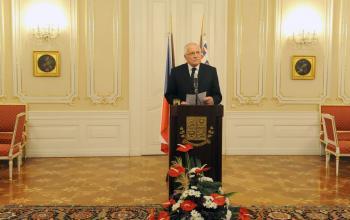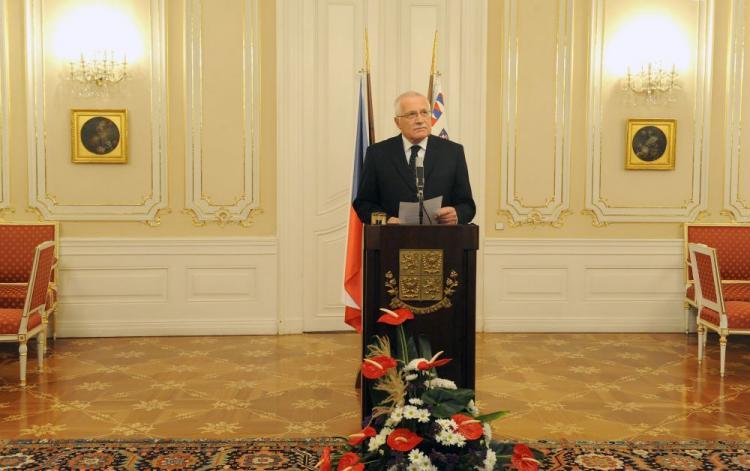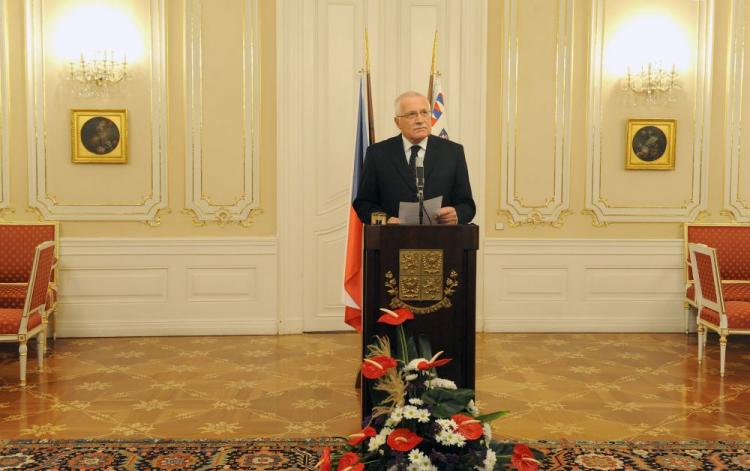BRATISLAVA, Slovakia—Away from journalists and their swarms of cameras, Czech President Vaclav Klaus quietly signed the Lisbon Treaty on Tuesday, Nov. 3, after the country’s Constitutional Court ruled that the EU document does not go against the Czech Constitution.
The president, who is regarded as generally skeptical about the European Union, announced his signature of the document at a press conference in the afternoon. He also made a jab at the finding of the Czech Court, saying the finding was politically influenced.
“Primarily I can’t agree with its content because once the Lisbon Treaty is validated, despite the political opinion of the Constitutional Court, the Czech Republic will cease to be a sovereign country,“ proclaimed the Czech president, known for his sharp criticism of the European Union and Lisbon Treaty in particular.
Klaus said last Friday that he will not raise further demands for alteration of the treaty after European leaders agreed to let the Czech Republic opt-out of the EU charter of fundamental rights, a clause which, it was alleged, could allow property claims from ethnic Germans and Hungarians forcibly displaced from Czechoslovakia after the second World War.
The Lisbon Treaty will come into force on Dec. 1, according to Swedish Premier Fredrik Reinfeldt. Sweden holds presidency of the European Union until the end of this year.
British Prime Minister Gordon Brown called the ratification “an important and historic step for all of Europe.”
Klaus’s signature concludes the EU’s eight-year struggle to ratify the Lisbon Treaty, a document which restructures how the European Union will operate. The document’s first incarnation, called the “European Constitution,” failed in 2005 after French and Dutch voters opposed it in referendums. The new document is a watered-down version of the former and was named after where it was signed: Lisbon, Portugal, which held presidency of the European Council at the time.
The treaty was in jeopardy after Ireland voted “no” in 2008; but Irish voters approved the document in a second attempt last month.
European leaders were surprised by the new demands from the Czech president. After his signature today, the Lisbon Treaty will finally come into force.
The treaty is supposed to streamline EU institutions, allowing the 27 member states to function more efficiently. It also creates two new positions: the high representative for Foreign Affairs and Security Policy and the president of the European Council.
Critics of the document believe it establishes a foundation for creating a kind of European “superstate,” where member states will have to surrender their sovereignty to the superstate step by step.
Following the Czech Republic’s ratification, the European Union can officially start looking for a new European president, as provided for in the Lisbon Treaty. Belgian Prime Minister Herman Van Rompuy and former U.K. Prime Minister Tony Blair are thought to be leading candidates.
The president, who is regarded as generally skeptical about the European Union, announced his signature of the document at a press conference in the afternoon. He also made a jab at the finding of the Czech Court, saying the finding was politically influenced.
“Primarily I can’t agree with its content because once the Lisbon Treaty is validated, despite the political opinion of the Constitutional Court, the Czech Republic will cease to be a sovereign country,“ proclaimed the Czech president, known for his sharp criticism of the European Union and Lisbon Treaty in particular.
Klaus said last Friday that he will not raise further demands for alteration of the treaty after European leaders agreed to let the Czech Republic opt-out of the EU charter of fundamental rights, a clause which, it was alleged, could allow property claims from ethnic Germans and Hungarians forcibly displaced from Czechoslovakia after the second World War.
The Lisbon Treaty will come into force on Dec. 1, according to Swedish Premier Fredrik Reinfeldt. Sweden holds presidency of the European Union until the end of this year.
British Prime Minister Gordon Brown called the ratification “an important and historic step for all of Europe.”
Klaus’s signature concludes the EU’s eight-year struggle to ratify the Lisbon Treaty, a document which restructures how the European Union will operate. The document’s first incarnation, called the “European Constitution,” failed in 2005 after French and Dutch voters opposed it in referendums. The new document is a watered-down version of the former and was named after where it was signed: Lisbon, Portugal, which held presidency of the European Council at the time.
The treaty was in jeopardy after Ireland voted “no” in 2008; but Irish voters approved the document in a second attempt last month.
European leaders were surprised by the new demands from the Czech president. After his signature today, the Lisbon Treaty will finally come into force.
The treaty is supposed to streamline EU institutions, allowing the 27 member states to function more efficiently. It also creates two new positions: the high representative for Foreign Affairs and Security Policy and the president of the European Council.
Critics of the document believe it establishes a foundation for creating a kind of European “superstate,” where member states will have to surrender their sovereignty to the superstate step by step.
Following the Czech Republic’s ratification, the European Union can officially start looking for a new European president, as provided for in the Lisbon Treaty. Belgian Prime Minister Herman Van Rompuy and former U.K. Prime Minister Tony Blair are thought to be leading candidates.






